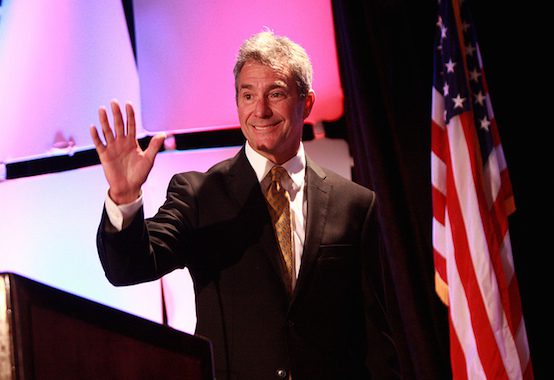The Libertarian Right’s Fringe Problem

Self-described constitutional conservatives are once again in vogue inside the Republican Party, but Greg Brannon is a bit of a rarity. First, his fidelity to the founding document applies to civil liberties as well as domestic programs. Second, his is a theoretically winnable race.
An obstetrician like Ron Paul and Tom Coburn, Brannon is running for Senate in North Carolina. He is the main Tea Party candidate seeking the nomination of the party that made Jesse Helms a five-term senator. Given incumbent Democratic Sen. Kay Hagan’s lackluster numbers and the overall political climate, anything is possible.
Brannon’s medical background enhances his case against both Obamacare and abortion. But what makes him stand out in a field where pro-life and anti-Obamacare stands are almost obligatory are his departures from the Bush Doctrine in a Southern state. “I believe that policies such as the indefinite detention of U.S. Citizens, executive kill lists, and warrantless wiretapping are un-American,” he says on his campaign website.
Unfortunately, Brannon has also stumbled into some of the pitfalls that have undone past “liberty” candidates. He—or more likely, his campaign staff—has been sloppy. Parts of his campaign site and position papers appear to have been plagiarized from Rand Paul (who has endorsed him) and Justin Amash.
As J. Arthur Bloom observes, “plagiarizing —even plagiarizing an ally—is self-defeating, and these incidents speak to a broader difficulty for libertarian Republicans as they attempt to make their case to the mainstream.” Bloom suggests they should “write their own damn copy.”
Brannon has also been dogged by a five-figure civil settlement with former business partners, stemming from a fizzled start-up company. In today’s economy, voters might be more understanding of entrepreneurial messiness. They may even find it endearing compared to the depredations of career politicians. But Brannon was found to have given misleading information to investors.
Most damning is Brannon’s solicitousness towards 9/11 truthers in a 2012 radio interview, even after the host tried to rescue him. Nothing in Brannon’s answer can be construed as an actual endorsement of core truther claims. It was mostly just mumbo-jumbo about the 9/11 Commission. But it was clear that he didn’t want to offend the caller by distancing himself from crazed conspiracy theories, even though he wasn’t running for office yet.
The interview was made public by Mother Jones, a magazine with little sympathy for Brannon’s conservative politics. But Mother Jones has covered Brannon’s fellow North Carolina conservative Walter Jones fairly.
Truthers are small in number, but the damage they do to the liberty movement is substantial. They prevent antiwar and civil libertarian arguments from getting a fair hearing on the right and center. And they cover otherwise serious forms of libertarianism and conservatism with a whiff of fringe nuttiness. Whatever all-caps YouTube comments and Facebook likes a candidate loses in taking a stand designed to make these people go away, it is well worth it.
Some generally sensible conservatives and libertarians will protest that while 9/11 trutherism may be bizarre, it is harmless compared to, say, having a war over nonexistent weapons of mass destruction. Whatever else can be said of this view, it is shortsighted. Like the worst excesses of the counterculture during the Vietnam War, when peace movements marginalize themselves in this way, they might as well start making pro-war arguments.
Now back to Brannon. The cumulative effect of all this, based on the limited public polling that exists, is that establishment candidate Thom Tillis may be opening up a lead that puts him within striking distance of the 40 percent required to avoid a runoff. If Brannon can make the runoff and beat Tillis, like Ted Cruz did to David Dewhurst in Texas in 2012, the controversies could hurt his generally slim lead over Hagan.
This isn’t exactly Helms’s North Carolina. The Research Triangle has grown. Barack Obama carried the state in 2008 and Mitt Romney didn’t win it by a big margin four years later. And it’s worth noting that Helms himself only exceeded 54 percent of the vote statewide once—in 1972, during his first Senate campaign, when Richard Nixon was crushing George McGovern.
The North Carolina Senate race is far from over, but much will need to happen to keep it from being added to the growing list of conservative disappointments. The Republican liberty movement particularly needs candidates like Greg Brannon to win in order to take the next step.
Taking that step will require putting away the childish things.
W. James Antle III is editor of the Daily Caller News Foundation and author of Devouring Freedom: Can Big Government Ever Be Stopped?
Comments